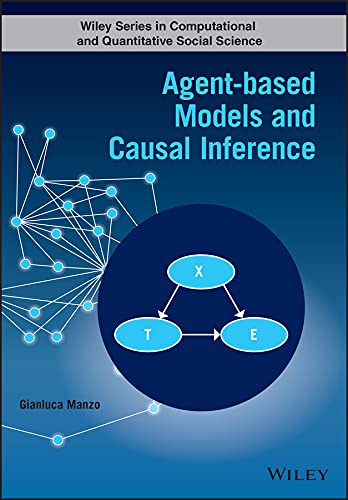

Most ebook files are in PDF format, so you can easily read them using various software such as Foxit Reader or directly on the Google Chrome browser.
Some ebook files are released by publishers in other formats such as .awz, .mobi, .epub, .fb2, etc. You may need to install specific software to read these formats on mobile/PC, such as Calibre.
Please read the tutorial at this link: https://ebookbell.com/faq
We offer FREE conversion to the popular formats you request; however, this may take some time. Therefore, right after payment, please email us, and we will try to provide the service as quickly as possible.
For some exceptional file formats or broken links (if any), please refrain from opening any disputes. Instead, email us first, and we will try to assist within a maximum of 6 hours.
EbookBell Team

0.0
0 reviewsAgent-based Models and Causal Inference
Scholars of causal inference have given little credence to the possibility that ABMs could be an important tool in warranting causal claims. Manzo’s book makes a convincing case that this is a mistake. The book starts by describing the impressive progress that ABMs have made as a credible methodology in the last several decades. It then goes on to compare the inferential threats to ABMs versus the traditional methods of RCTs, regression, and instrumental variables showing that they have a common vulnerability of being based on untestable assumptions. The book concludes by looking at four examples where an analysis based on ABMs complements and augments the evidence for specific causal claims provided by other methods. Manzo has done a most convincing job of showing that ABMs can be an important resource in any researcher’s tool kit. Agent-based Models and Causal Inference is a first-rate contribution to the debate on, and practice of, causal claims. With exemplary rigor, systematic precision and pedagogic clarity, this book contrasts the assumptions about causality that undergird agent-based models, experimental methods, and statistically based observational methods, discusses the challenges these methods face as far as inferences go, and, in light of this discussion, elaborates the case for combining these methods’ respective strengths: a remarkable achievement. Ivan Ermakoff, Professor of Sociology, University of Wisconsin-Madison, USA Agent-based models are a uniquely powerful tool for understanding how patterns in society may arise in often surprising and counter-intuitive ways. This book offers a strong and deeply reflected argument for how ABM’s can do much more: add to actual empirical explanation. The work is of great value to all social scientists interested in learning how computational modelling can help unraveling the complexity of the real social world. Andreas Flache, Professor of Sociology at the University of Groningen, Netherlands Agent-based Models and Causal Inference is an important and much-needed contribution to sociology and computational social science. The book provides a rigorous new contribution to current understandings of the foundation of causal inference and justification in the social sciences. It provides a powerful and cogent alternative to standard statistical causal-modeling approaches to causation. Especially valuable is Manzo’s careful analysis of the conditions under which an agent-based simulation is relevant to causal inference. The book represents an exceptional contribution to sociology, the philosophy of social science, and the epistemology of simulations and models. Daniel Little, Professor of philosophy, University of Michigan, USA Agent-based Models and Causal Inferencedelivers an insightful investigation into the conditions under which different quantitative methods can legitimately hold to be able to establish causal claims. The book compares agent-based computational methods with randomized experiments, instrumental variables, and various types of causal graphs. Organized in two parts,Agent-based Models and Causal Inferenceconnects the literature from various fields, including causality, social mechanisms, statistical and experimental methods for causal inference, and agent-based computation models to help show that causality means different things within different methods for causal analysis, and that persuasive causal claims can only be built at the intersection of these various methods. Readers will also benefit from the inclusion of: Perfect for academic social scientists and scholars in the fields of computational social science, philosophy, statistics, experimental design, and ecology,Agent-based Models and Causal Inferencewill also earn a place in the libraries of PhD students seeking a one-stop reference on the issue of causal inference in agent-based computational models.
Christopher Winship,Diker-Tishman Professor of Sociology, Harvard University, USA